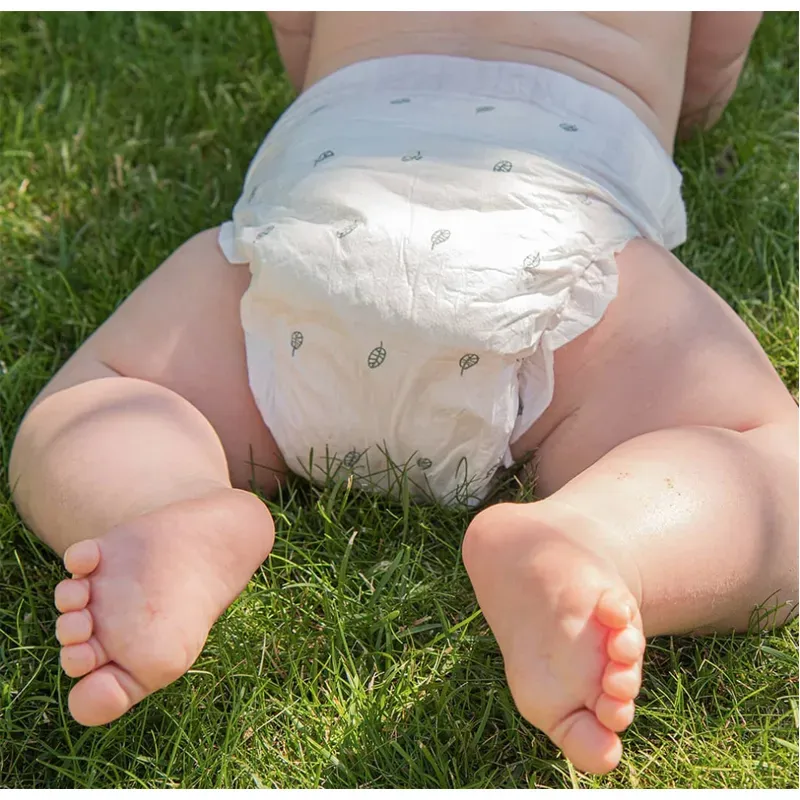In recent years, biodegradable diapers have emerged as a groundbreaking solution to the environmental woes associated with traditional disposable diapers. These innovative alternatives, made from eco-friendly materials, aim to reduce the ecological impact of the $60 billion diaper industry, where millions of diapers are discarded every minute. By utilizing biodegradable materials, including examples developed by companies like ZymoChem, parents can make a more sustainable choice for their little ones. The key difference lies in the production of super absorbent polymers, which these biodegradable options replace with low carbon footprint products. As more families seek sustainable diapers, the demand for these eco-friendly diaper options continues to grow, paving the way for a cleaner future.
The conversation around eco-conscious parenting has shifted towards comfortable, sustainable products for infants, particularly in the realm of disposable options. Diapering, a fundamental aspect of caring for babies, now encompasses a broader selection of greener alternatives designed to alleviate the burden on landfills. Terms such as compostable or environmental diapers often enter discussions, highlighting the need for solutions that utilize renewable resources to avoid harmful plastics. Companies like ZymoChem are revolutionizing the diaper market by tailoring biodegradable materials that align with the modern family’s values of sustainability. This shift not only enhances the health of Mother Earth but also responds to the urgent call for environmentally responsible baby care.
Introducing Biodegradable Diapers: A Sustainable Solution
Biodegradable diapers offer an innovative solution to the environmental challenges posed by conventional disposable diapers. With the rising awareness of sustainability and eco-friendliness, parents are increasingly seeking alternatives that align with their values. These diapers are designed to break down naturally over time, significantly reducing landfill contributions. Companies like ZymoChem are pioneering the use of biodegradable materials derived from renewable sources, such as corn sugar, to create absorbent technology that minimizes environmental impact.
The switch to biodegradable diapers not only benefits the environment but also introduces parents to a range of eco-friendly diaper options. Unlike traditional diapers that rely heavily on fossil fuel-based super absorbent polymers, biodegradable options utilize organic materials that provide similar absorbent qualities. This shift towards sustainable diapers represents a broader trend in consumer behavior, where individuals prioritize products that support a healthier planet for future generations.
Understanding the Beer-Making Process in Diaper Production
The beer-making process utilized by ZymoChem is a fascinating approach to producing eco-friendly super absorbent polymers. By fermenting renewable resources, this innovative methodology transforms corn sugars into biodegradable materials that can effectively replace traditional plastics in diapers. This technique highlights the potential of bioprocessing, which has applications far beyond just diaper manufacturing, including numerous hygiene products that can benefit from sustainable practices.
This revolutionary fermentation process not only aims to reduce carbon footprints but also to achieve cost parity with conventional methods that rely on petrochemicals. As this technology matures, consumers may soon find higher-quality, affordable biodegradable diapers on the market. The alignment of food production techniques with consumer goods like diapers illustrates a promising fusion of industries that could reshape how we think about waste and sustainability.
The Impact of Super Absorbent Polymers on Diaper Sustainability
Super absorbent polymers (SAPs) are integral to the functionality of disposable diapers, providing the necessary absorbency for liquid containment. However, the vast majority of these polymers are derived from non-renewable fossil fuels, which poses significant sustainability issues. ZymoChem is revolutionizing this aspect of diaper production by producing bio-based super absorbent polymers that are both efficient and environmentally friendly. By replacing half of the petroleum-derived content with biodegradable alternatives, the company’s products help to diminish the ecological footprint of diaper usage.
Transitioning to biodegradable SAPs represents a critical step toward a more sustainable diaper industry. Not only do these materials decompose more readily than their plastic counterparts, but they also enhance the overall sustainability of products when combined with responsibly sourced materials. By focusing on transforming diaper production into a less harmful process, the industry can cater to environmentally conscious parents looking for effective solutions without compromising performance.
Eco-Friendly Diaper Options: Beyond the Traditional Choices
The market for eco-friendly diaper options has seen significant growth as parents become more conscious of their environmental impact. Compostable diapers, made from renewable materials like wood pulp and bamboo, have gained popularity; however, they often face challenges related to accessibility and absorbency. This has opened the door for innovative alternatives such as biodegradable diapers produced by companies like ZymoChem, which are striving to marry absorbency with sustainability.
Furthermore, the introduction of biodegradable materials into the diaper market reflects a trend toward holistic environmental responsibility. Many brands, recognizing the need for improvement, are exploring various eco-friendly options in response to consumer demands. It is crucial for parents to stay informed about which products align with their commitment to sustainability, thus supporting companies that prioritize environmental stewardship while providing quality diapering solutions.
The Role of ZymoChem in Redefining Diaper Sustainability
ZymoChem serves as a key player in reshaping the future of diapers through its commitment to innovative, sustainable practices. Their focus on utilizing a unique fermentation process to create biodegradable absorbents marks a significant advancement in the industry. This approach allows for the development of products that not only meet the absorbent needs of babies but also alleviate some of the environmental burdens associated with traditional diaper manufacturing.
By producing drop-in absorbents that can be incorporated into existing diaper lines, ZymoChem demonstrates a scalable model that can enhance sustainability across the board. This flexibility offers collaboration opportunities with established brands, paving the way for a transition to greener products while maintaining consumer trust and comfort. Such innovative steps taken by ZymoChem underscore the potential for major advancements within the eco-friendly diaper sector, driving further interest and investments.
Funding and Future Directions for Biodegradable Diapers
ZymoChem’s growth trajectory is supported by substantial funding from notable investors, which highlights the increasing interest in sustainable diaper technologies. With over $35 million raised from venture capital sources, including Toyota Ventures and Lululemon, the company is poised for significant advancements. This financial backing not only aids in research and development but also enables ZymoChem to scale its operations, which is crucial for meeting growing consumer demand for sustainable products.
As ZymoChem continues to innovate and refine its offerings, the future looks promising for biodegradable diapers. The potential for market expansion is vast, as more families embrace eco-friendly options, and retailers begin to prioritize sustainability in their product selections. Investments in such technologies signal a shift towards a more environmentally conscious consumer landscape, providing parents with access to sustainable options that do not compromise on quality.
Consumer Awareness: The Shift Towards Sustainable Diapers
In recent years, there has been a notable shift in consumer awareness surrounding the environmental impacts of disposable diapers. Parents are increasingly interested in exploring sustainable diapers that minimize their carbon footprint while effectively meeting their children’s needs. This shift is driven by a growing understanding of the long-lasting effects that non-biodegradable products can create in landfills, leading many to seek innovative alternatives like biodegradable diapers.
Brand transparency and environmental stewardship have become key factors for modern parents selecting diaper products. Companies like ZymoChem are gaining traction as they address these concerns head-on, focusing on sustainable practices and materials. By openly communicating their methods and the benefits of switching to biodegradable options, brands can foster trust and encourage a more significant transition towards eco-friendly diapering solutions.
The Future of Hygiene Products: Inspiration from Diaper Technology
The innovations developed by ZymoChem for biodegradable diapers are not limited to just one product category. The principles behind their fermentation processes and bio-based materials can be adapted for a wide range of hygiene products. This versatility highlights the potential for creating a new market segment that prioritizes sustainability across various everyday items, from feminine hygiene products to adult incontinence solutions.
As awareness of environmental justice continues to grow, the adaptation of biodegradable technologies will inspire broader change within the hygiene sector. Companies adopting similar practices can tap into a new demographic of eco-conscious consumers looking for products that reflect their values. Embracing this cross-industry collaboration can play a pivotal role in reducing plastic waste and developing a circular economy that benefits both manufacturers and consumers alike.
Challenges and Innovations in the Diapers Market
While ZymoChem and other companies work diligently to innovate within the sustainable diaper space, several challenges remain. A significant hurdle is shifting consumer perceptions of biodegradable diapers compared to traditional models in terms of both effectiveness and price. Educating consumers about the benefits of biodegradable materials, such as their eco-friendly attributes and improved disposal, is vital to overcoming these reservations.
Moreover, while ZymoChem focuses on developing biodegradable absorbent cores, widespread implementation depends on partnerships with existing diaper manufacturers. To truly revolutionize the market, collaboration will be crucial in ensuring the integration of these sustainable materials into products familiar to consumers. This strategy not only heightens the awareness of eco-friendly options but also encourages a more extensive adoption of sustainable practices across the diaper industry.
Frequently Asked Questions
What are biodegradable diapers and how do they differ from traditional disposable diapers?
Biodegradable diapers are designed to break down naturally in the environment, unlike traditional disposable diapers that contain fossil-based plastics and super absorbent polymers. Most conventional diapers take hundreds of years to decompose, while biodegradable options often utilize eco-friendly materials like those developed by companies such as ZymoChem.
How effective are biodegradable materials in creating sustainable diapers?
Biodegradable materials, when used in the production of sustainable diapers, significantly reduce the environmental impact of diaper disposal. ZymoChem’s innovative absorbents, made from renewable resources through fermentation, offer a low carbon footprint, enhancing the sustainability of diaper products.
Are there alternatives to biodegradable diapers that parents can consider?
Yes, parents can consider eco-friendly diaper options such as compostable diapers made from materials like wood pulp and bamboo. However, these may not always be as absorbent as traditional options. Additionally, cloth diapers remain a viable choice for about 20% of the U.S. market, offering a reusable alternative to disposable diapers.
What role does ZymoChem play in the production of biodegradable diapers?
ZymoChem specializes in creating biodegradable absorbent cores that can be integrated into various diaper brands. They utilize a fermentation process to convert renewable sugars into biodegradable materials, providing a more sustainable alternative to conventional super absorbent polymers found in traditional diapers.
Can biodegradable diapers be manufactured at a cost-effective rate?
ZymoChem is approaching cost parity with fossil-fuel-based super absorbent polymer production, indicating that biodegradable diapers could soon be produced at a competitive price. This breakthrough would support wider adoption of sustainable diaper solutions in the market.
What is the environmental impact of traditional disposable diapers compared to biodegradable options?
Traditional disposable diapers contribute significantly to landfill waste, with approximately 300,000 diapers disposed of every minute. In contrast, biodegradable diapers are designed to decompose more quickly, reducing long-term environmental harm and supporting a circular economy through renewable material usage.
Are biodegradable diapers available on the market now?
While ZymoChem does not yet have its own diaper products, they are working with other companies to provide their biodegradable absorbents. As demand for sustainable options grows, we can expect more biodegradable diapers to become available from various manufacturers.
What benefits do biodegradable diapers have for the future of diaper manufacturing?
Biodegradable diapers offer numerous benefits, including reduced environmental impact, the potential for a circular economy, and the ability to utilize renewable resources for manufacturing. Innovations from companies like ZymoChem pave the way for cleaner and more sustainable hygiene products.
| Key Points | Details |
|---|---|
| Industry Impact | Disposable diapers represent a $60 billion industry, significant for its environmental impact. |
| Environmental Concerns | 300,000 diapers are disposed of every minute, taking hundreds of years to decompose. |
| Alternatives | Compostable and cloth diapers are options, but face challenges in market acceptance and accessibility. |
| ZymoChem’s Innovation | Utilizes fermentation of renewable resources to create biodegradable super absorbent polymers. |
| Scalability | ZymoChem’s approach allows for potential cost parity with traditional materials and promotes a circular economy. |
| Investment and Future Prospects | Backed by significant investors, ZymoChem aims to extend its innovations to various products beyond diapers. |
Summary
Biodegradable diapers are becoming a crucial solution to the significant environmental issues posed by traditional disposable diapers. Innovations from companies like ZymoChem offer a promising shift towards cleaner alternatives by using renewable resources and reducing reliance on fossil fuels. As awareness grows and technology advances, biodegradable diapers may pave the way for a sustainable future in baby care products.



